This post contains affiliate links. Please see our disclosure policy.
Want to get fit in less time? Behold the full-body kettlebell workout! The kettlebell is a unique training tool that gives you a complete workout in record time!
Keep reading and you’ll learn how to use a kettlebell in this full-body kettlebell workout for beginners.
Why We Love A Full Body Kettlebell Workout
In today’s world, there are so many ways to train: you can lift barbells, curl dumbbells, run on a treadmill, practice yoga, etc.
And while each of these activities targets specific fitness goals – barbells and dumbbells strengthen muscles, treadmills improve the cardiovascular system and yoga gives you flexibility – a kettlebell workout accomplishes all of those goals together!
Kettlebell training is not the same as basic weight training. Kettlebell training is your ticket to a combination of strength, cardio and flexibility all in one!
In addition to making you strong, just 20 minutes using these cannonball-shaped weights with handles offers a workout that delivers more fat-fighting and body-toning benefits than jogging for 30 minutes on a treadmill. How? Read on if you’re interested in learning about kettlebells for beginners!
Benefits Of Kettlebell Workouts
Kettlebell fitness is a super-efficient way to train.
It is quite different than working with dumbbells and barbells, which provide a more static, methodical type of training.
Kettlebell training is a more fluid, motion-based and dynamic form of exercise that taps into your central nervous system and relies on the activation of multiple muscles for each and every movement.
Kettlebells also strengthen your muscles and burn fat and calories by tapping into your cardio system. Win, win! But wait, there’s more! Check out these amazing kettlebell benefits:
- Improved Strength
- Enhanced Coordination
- Improved Balance and Flexibility
- Cardiovascular Health Benefits
- Increased Range of Motion
- Time-Efficient
That last benefit – being time-efficient- is one that catches the attention of most people. Time is precious and our lives are busier than ever. If you can get more from your workout in less time, then that’s a no-brainer.
According to the American Council on Exercise, kettlebells can provide a higher intensity workout than the usual strength training routine in a shorter amount of time. This is because kettlebell training simultaneously works your cardio endurance, strength, balance and flexibility.
Using the kettlebell helps you perform a greater range of motion and activate more muscles with each movement.
Let’s take a look at the different parts of the kettlebell, how to use it, and what you need to do in order to get a safe, effective workout in less time.
Kettlebells for Beginners
Kettlebells are weighted balls with a handle, which allow the weight to swing and move as you move it from place to place.
Unlike the dumbbell, which has a fixed position – equal on both sides – the kettlebell allows for more movement, a bigger range of motion, and the activation of more muscles.
The Parts of a Kettlebell
Kettlebell Features
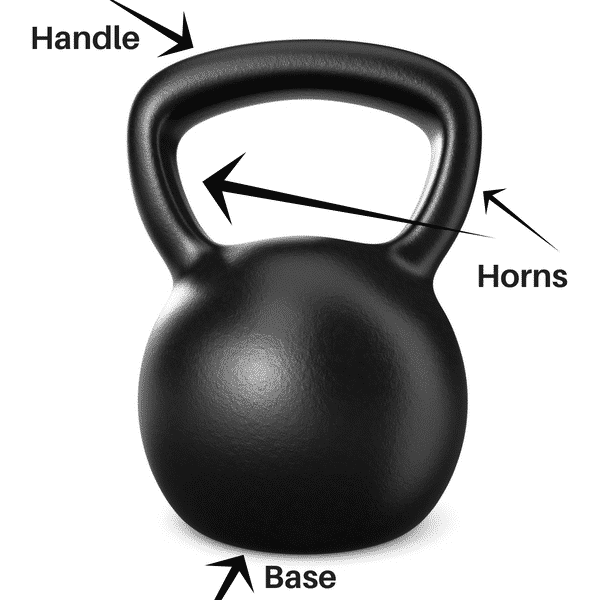
Handle: Most common spot to hold, so you can swing the bell and pass it from hand to hand.
Horns: Alternate grip, especially if you are holding the bell upside down.
Base: The heaviest part of the bell. Gripping it here provides more stability.
Kettlebell Vs. Dumbbell
So given a choice should you go with kettlebells or dumbbells? The answer is… both!
Don’t think of it as an “either/or” situation, but consider that both are good in different ways.
When to Choose Dumbbells
They are excellent when you are looking for pure strength training and building muscle. Chest press, squat, tricep kickbacks, mid-back rows… there are countless exercises available to you if you know how to use them.
Perhaps known for isolation moves like bicep curls, keep in mind that dumbbells are also great for multi-joint exercises and power moves as well.
In addition, dumbbells are easy to grip and reliable when you hold them.
Due to this, there are many moves you can perform safely with dumbbells that you cannot do with the kettlebell.
When to Choose Kettlebells
Kettlebell exercises are also great for strength training but they give you the option for fluid, functional moves. The type of movement that can be done with the kettlebell is more dynamic in nature.
For instance, a squat with dumbbells should be done in a steady, slow and controlled way. On the other hand, a kettlebell swing is done with power and in constant motion. It is faster in nature.
This brings on the other benefit of kettlebell training: cardiovascular benefits.
You easily get a cardio workout when you go through kettlebell exercises.
The dynamic nature of the movement gets your heart rate up quickly. This can happen with dumbbells as well, but kettlebells are designed for this effect.
What Muscles Do Kettlebells Work?
There is no limit to the muscles kettlebells work.
They can work virtually any muscle that you decide you want to target. However, the primary targets of many kettlebell exercises–especially kettlebell swings–are hips, glutes, hamstrings and core.
So let’s say you want to add triceps to the mix.
You pick up that kettlebell, raise it overhead, then lower slowly back behind your head and press it up for a tricep overhead press.
Want some mid-back definition? Hold the kettlebell, hinge forward and pull the kettlebell to your hip bone for a mid-back row.
How about an awesome powerhouse kettlebell leg workout? If there’s a muscle you’re ready to work, there is a kettlebell move to meet your needs!
How many calories does a kettlebell workout burn?
It’s a torcher!
A kettlebell workout can burn up to 20 calories per minute – as much as running a 6-minute mile!
What Size Kettlebell Should I Get?
The weight you choose for your kettlebell is going to depend on several factors including your fitness level, size, and strength ability.
It is recommended that the average woman start out with a 15-pound kettlebell for the larger muscle movement kettlebell exercises.
If you are a kettlebell beginner, you can always start lighter. If you are an athletic woman, you can likely go up to 20; don’t be afraid to go heavy.
Men can go slightly heavier starting at 20 pounds for the average male and 25 for an athletic man.
For a single joint move like tricep presses, you may need to go lighter. On the other hand, for something like a two-handed deadlift you may need to go heavier.
Ultimately a kettlebell user will end up owning more than one set!
Why not go to your local sporting goods store this weekend so you can hold a kettlebell for yourself.
Using Kettlebells
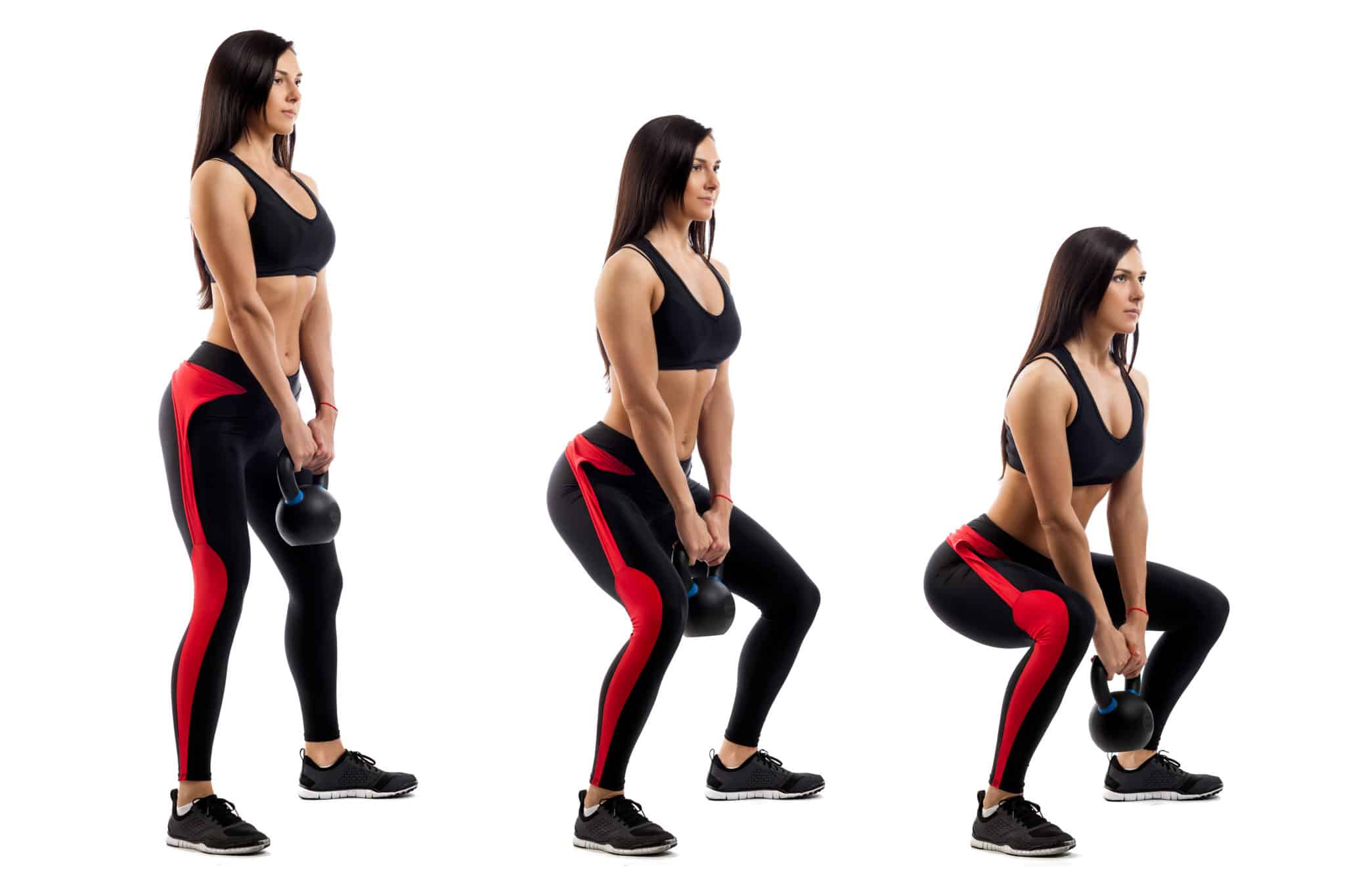
This is one of the most important things to get out of this full body kettlebell workout guide for beginners.
One thing that is extremely crucial when deciding to train with kettlebells is to learn good form!
Do not go into kettlebell training without some sort of tutorial whether live from a certified trainer or via online training from a qualified professional.
Indeed, poor understanding of the use of kettlebells can lead to injury just as it can with weight training. There are basic techniques to keep in mind and check out the video below demonstrating the proper form for a kettlebell swing:
How to Use a Kettlebell
Core Comes First: Before you begin to swing those bells, tighten up your low abs and keep them pulled in the entire time.
Imagine sliding on a tight pair of jeans and how you pull in the muscles in order to zip those jeans. This muscle activation will protect your lower back and define your abs.
Good Posture
Be sure to keep your shoulders pulled back and down, chest lifted and, again, abs pulled in tight. Posture is extremely important.
A good rule of thumb is that your body follows your eyes. If you look straight ahead you will likely be more apt to keep a long spine. If you look at the floor, your back will hunch over to match that.
Powerful, Controlled Movement
While it might look uncontrolled from the outside, you are always moving in a controlled motion. If you can originate the movement from your glutes, legs and core, everything else will stay aligned and safe.
Use a Pro
As stated before, your best bet is to get a professional to help you learn how to use the kettlebells at first.
Try a class, hire a trainer or follow along with our Raise Some Bell workouts on Get Healthy U TV. It won’t take long and you’ll be on your way to awesome training and amazing results!
Full Body Kettlebell Workout for Beginners
Kettlebell Swing
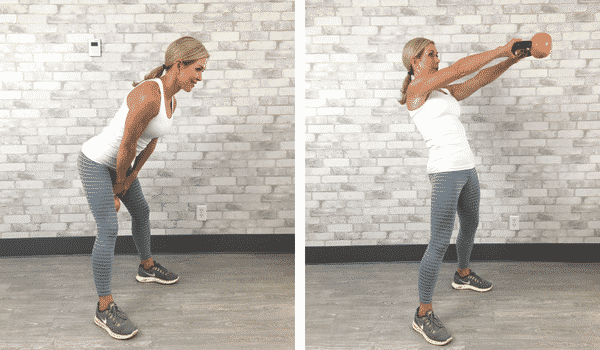
Targets: shoulders, back, glutes, legs
How To: Stand with your feet hip-width apart and grab the handle with both hands, palms down.
With a slight bend at the knees keeping shins perpendicular to the floor, pull the kettlebell under your crotch, then drive the hips forward with power while swinging the kettlebell keeping abs tight.
Make sure the top of the horn of the kettlebell never goes below the knees.
The kettlebell should move due to the momentum and hip motion, not from the arms or shoulders.
Use your core!
Try 12-15 reps.
Reverse Lunge Press
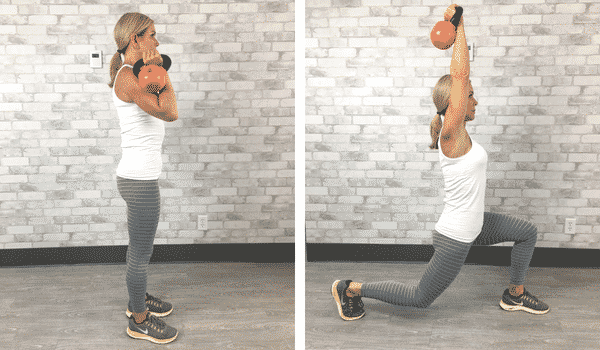
Targets: Shoulders, glutes, legs, core
How To: Stand with your feet a few inches apart holding kettlebell in your right hand alongside right shoulder.
Step back with right leg into a deep lunge while pressing right arm straight up and keeping abs tight.
Keep spine tall!
Step forward and lower kettlebell back to shoulder. Repeat 10 times then switch sides.
Kettlebell Around the World
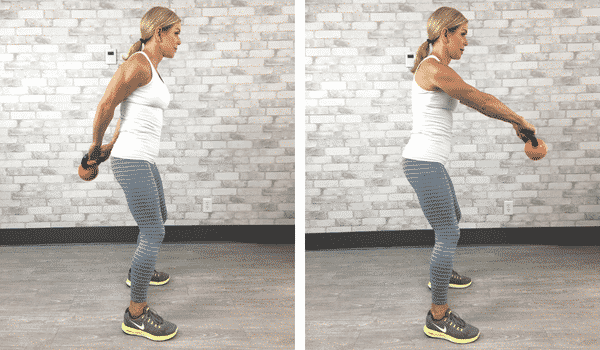
Targets: Back, arms, core, obliques
How To: Stand with your feet hip-width apart holding kettlebell in front of chest with arms extended.
Reach kettlebell around your back with your right hand, grab with your left hand and return to the front grabbing with your right hand again for another circle.
Try 10 circles then change direction.
Kettlebell Row and Lunge
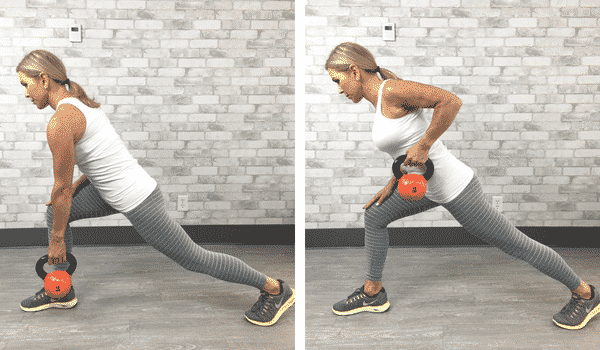
Targets: Back, glutes, legs
How To: Stand in a stationary lunge position with right foot forward, left foot back resting on the ball of foot holding a kettlebell by the handle in the left hand.
Hinge forward slightly with abs tight and left arm hanging long.
Use upper back to row the bell toward your hip, release slowly, lower back knee to lunge, return leg back.
Repeat in row-lunge order 10 times then switch sides.
Kettlebell Uneven Push-Up
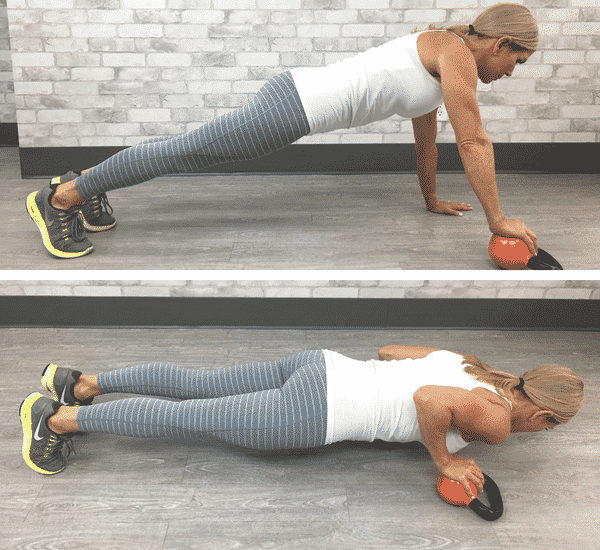
Targets: Chest, back, shoulders, arms, core
How To: Start in plank or kneeling plank position with the right hand resting on the base of the kettlebell and the left hand on the floor.
Both hands are directly below shoulders.
Lower chest to kettlebell then presses up slowly. Repeat 5 times then switch hands.
Single-Arm Kettlebell Swing:
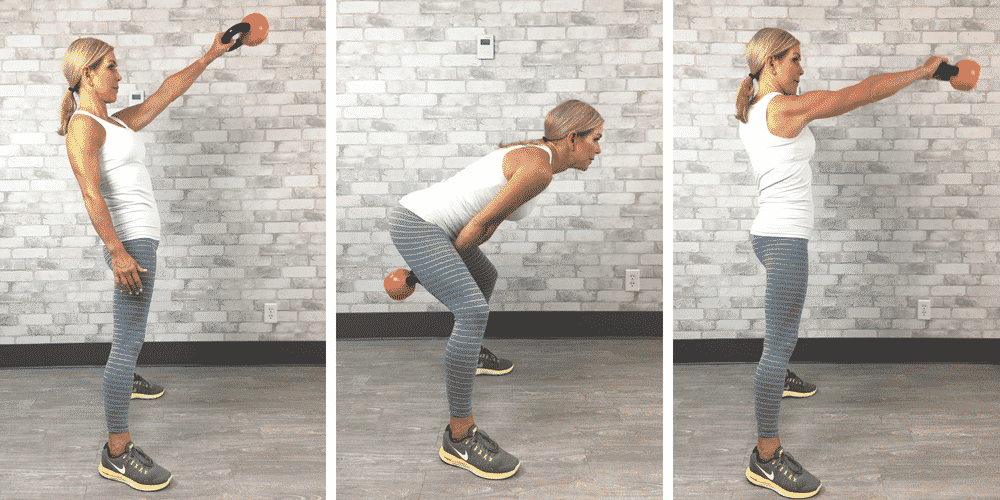
Targets: shoulders, back, glutes, legs
How To: This is the same as the kettlebell swing but you use one arm at a time, switching hands when the kettlebell is out in front of you.
Stand with your feet hip-width apart and grab handle with right hands, palm down.
With a slight bend in the knees, pull the kettlebell under your crotch then drive the hips forward with power while swinging the kettlebell keeping your abs tight.
Switch hands before bringing it back under your body.
The kettlebell should move due to the hip motion, not from the arms or shoulders.
Use your core!
Try 12-16 reps total, alternating hands.
Kettlebell Dead Lift
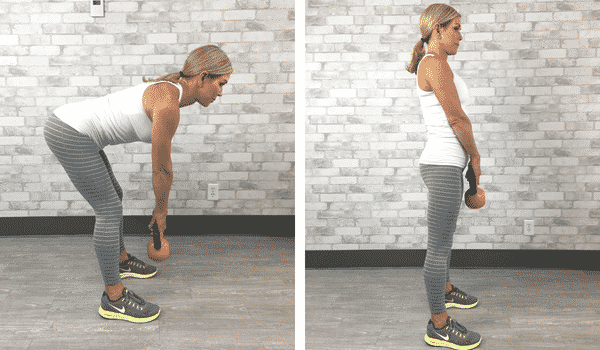
Targets: Glutes, legs, core
How To: Stand with feet hip-width apart holding kettlebell handle in both hands in front of you.
With a slight bend in your knees lower the kettlebell down along the front of your shins as you push your butt back and keep your abs pulled in a back long.
As you stand back up squeeze your glutes and hamstrings to lift you.
Try 10 times.
Kettlebell High Pull
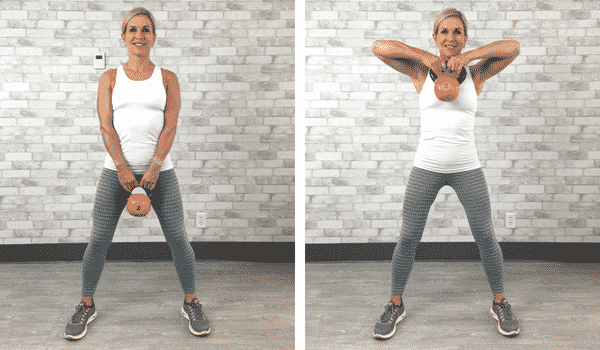
Targets: Glutes, legs, shoulders
How To: Stand with feet shoulder-width apart, toes turned slightly outward.
Hold handle of kettlebell with both hands, arms hanging straight down in front of you.
Bend knees slightly with spine tall then press up with legs quickly while simultaneously pulling hands to the chin.
You will end up rising onto your toes as you come up. Initiate the movement from your legs and glutes with power. These are fast.
Repeat 10 times.
Kettlebell Russian Twist
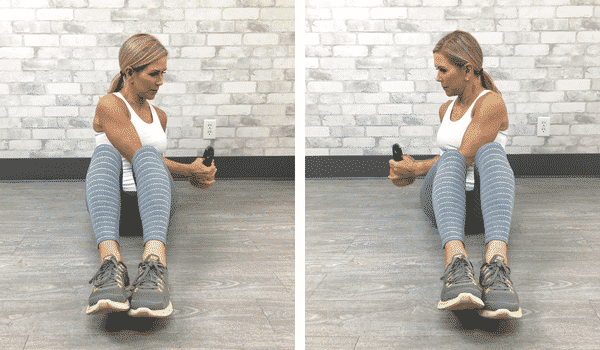
Targets: Core, lower back, obliques
How To: Sit tall with knees bent and feet on the floor a few inches apart.
Hold the kettlebell close to your chest with both hands the scoop out at your belly by drawing your navel toward your spine and rolling your spine back into a “C” shape.
Rotate the kettlebell from side to side -from right hip bone to left hip bone – keeping elbows close to the side and moving with the strength of the obliques (not the arms).
Make it harder: Lift feet slightly off the ground as you twist!
Kettlebell Side Plank
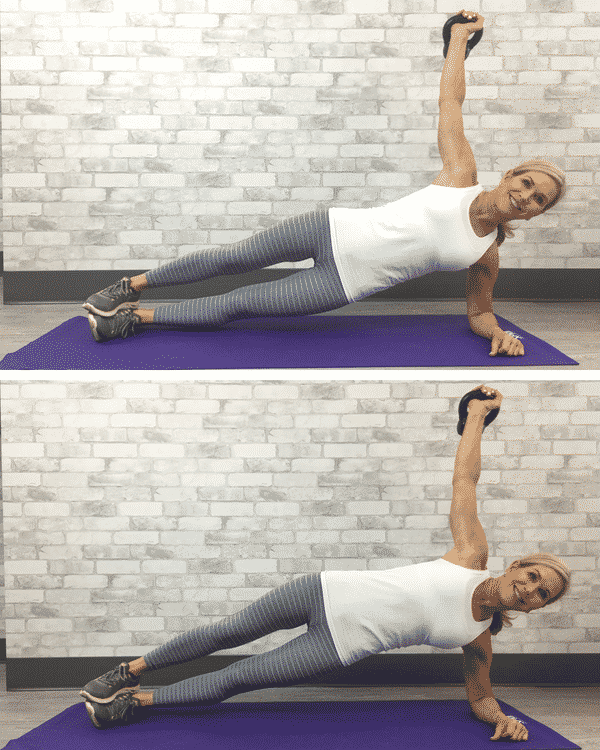
Targets: Obliques, Low Abs, Hips
How To: Lie on the left side with the left elbow bent under shoulder, legs extended in line with hips and feet stacked.
Hold kettlebell handle in right hand, resting it on the back of forearm, with right arm extended overhead in line with shoulder.
Pull abs in tight and press down through left arm to lift hips off the floor into full side plank.
Try to lengthen up through right arm while pressing down with left arm, pressing shoulders down away from ears.
Keeping right arm stable, lower hips to starting position.
Try 15 reps then switch sides.
Kettlebell Squat
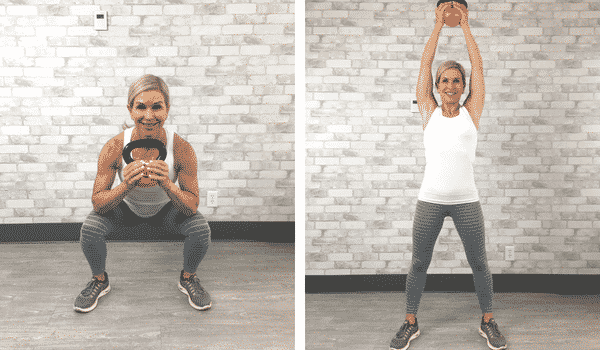
Targets: Glutes, legs
How To: Grip the kettlebell by the base (the round part) and hold it in front of your chest.
Stand with feet hip-width apart, toes slightly turned out.
Sit back, lowering your butt back over your heels and bending your knees as you go down.
Squeeze glutes to rise back to standing while you press the kettlebell over your head.
Repeat 10 times.
Kettlebell Squat, Catch, Press
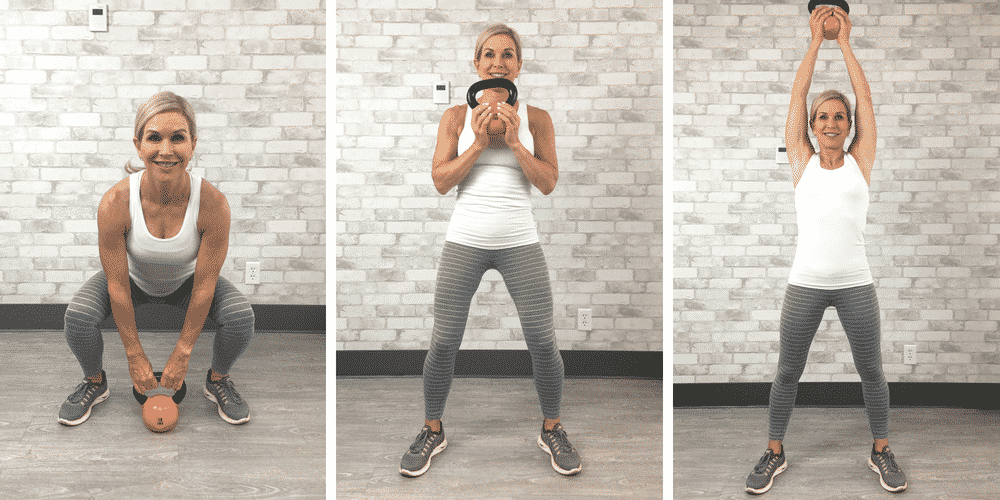
Targets: Glutes, legs, core, back, shoulders, arms
How To: Grip the kettlebell with two hands by the handle and hold it between your legs.
Sit back into a deep squat to begin.
Give a small jump and pull the kettlebell quickly up catching it by the base (the round part) at your chest.
Then stand all the way up pressing the kettlebell overhead.
Squat back down and begin again. This power move should be done fast.
Try 8 times.


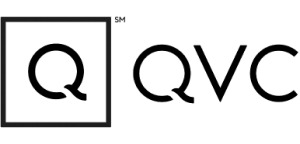
have you ever considered keto
useful information thanks for your post.
Nice article, thanks for sharing effective information This is really an important thing to consider for the SEO point of view.Thank you very much.
Nice article, thanks for sharing effective information this is really an important thing to consider for the health point of view. Thank you very much.
Absolutely! We are here to keep you happy, healthy, and moving your body at all stages of life. That begins with moving your body and moving it with proper form! I’m all about form when it comes to fitness.